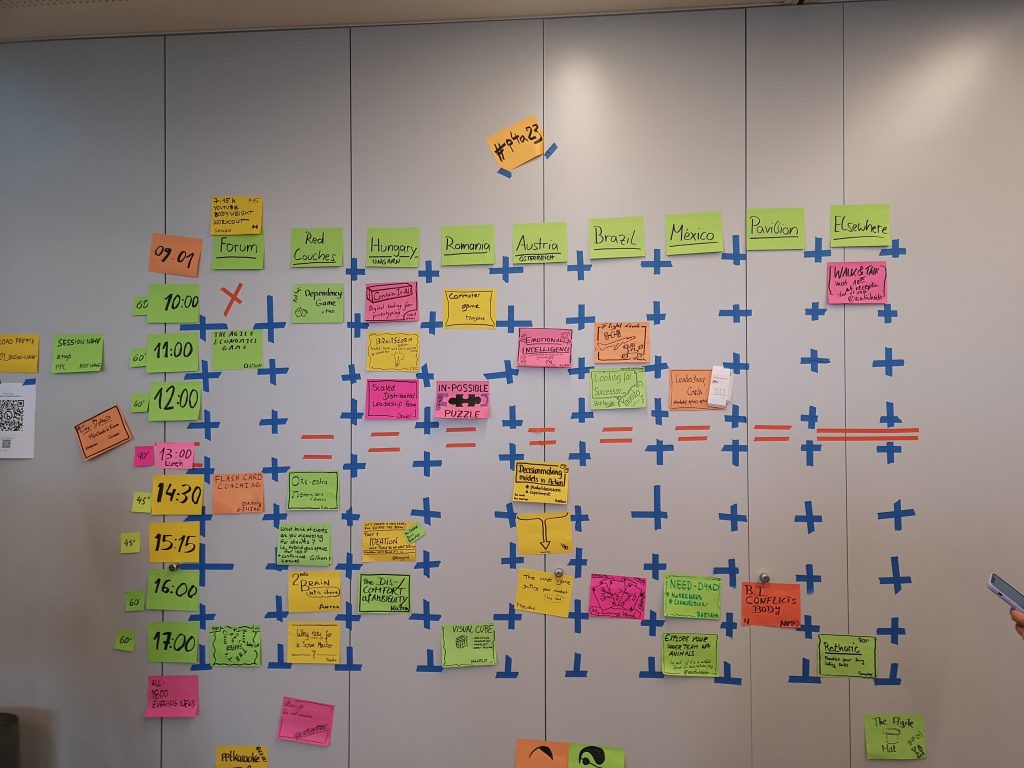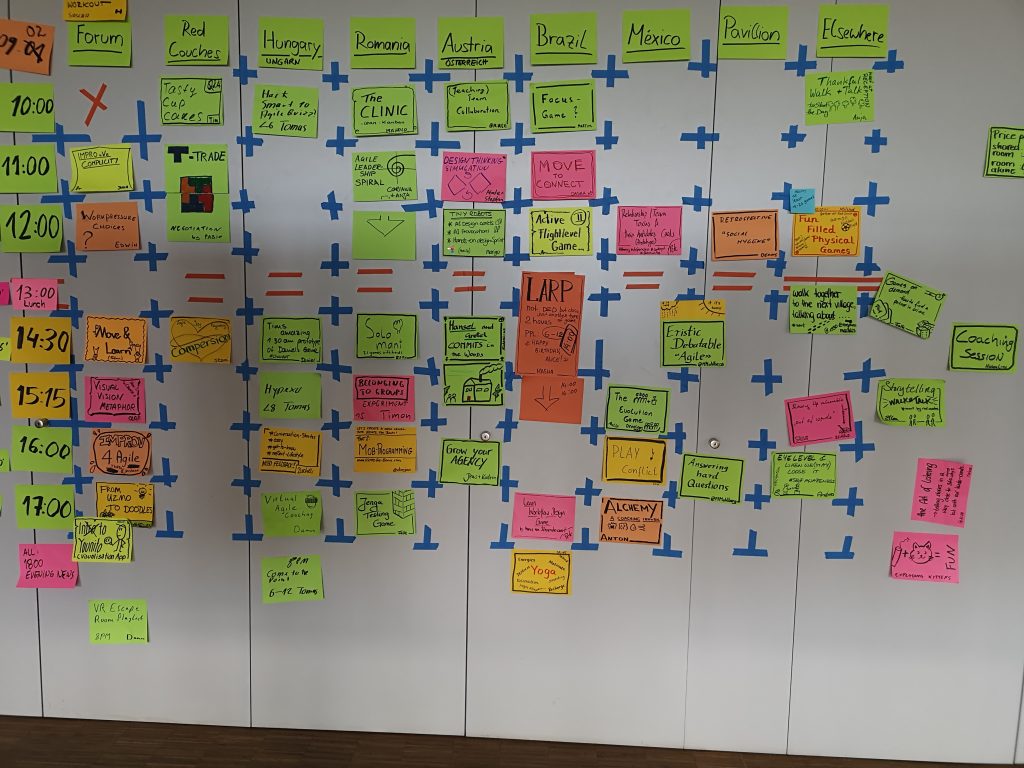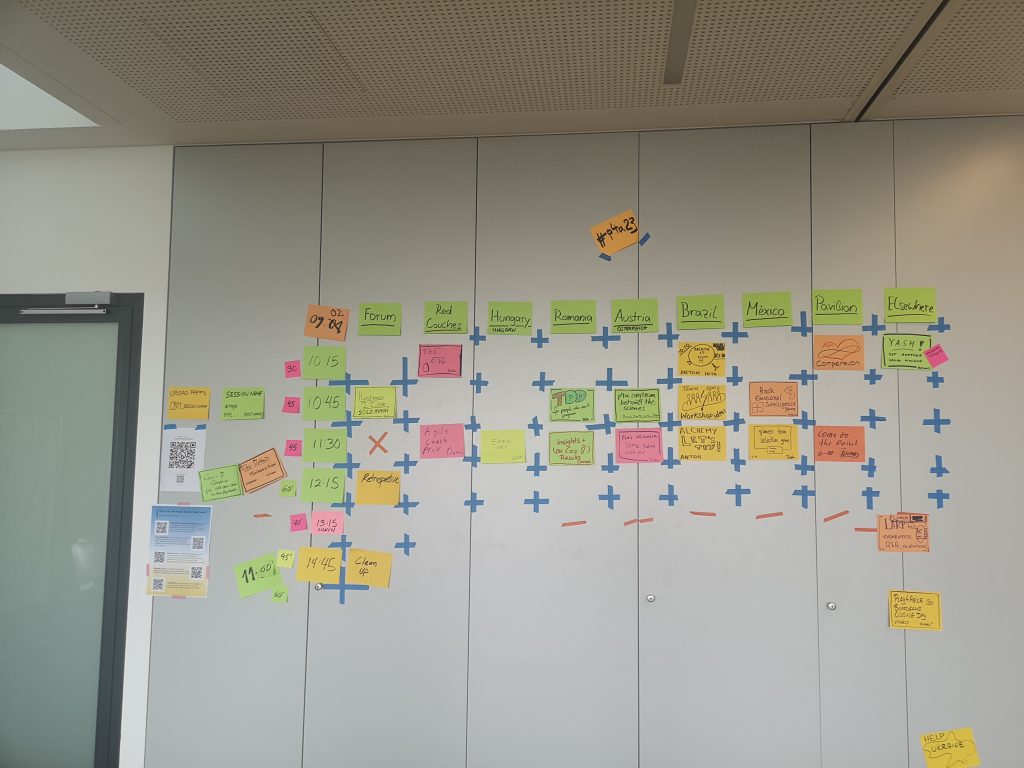Last weekend I took in Play4Agile 2023 (p4a23) at the wonderful Seminar Zentrum Rueckersbach. I’m happy to be an organiser of this event. We had 80+ people talking about software development, and related topics. As these were all trainers, coaches, scrum masters, and others in the agile community, p4a keeps teacIhing me about software development. I find attending this event the most important thing that I can do in order to keep my teaching of software development focused on relevant topics.
Play4Agile is an open space event
As an open space unconference event, with the agenda for the day created each morning, I only need to turn up with some ideas of what I want to talk to people about. If I need materials, then I bring those, otherwise, it is enough to arrive with the intent. Then I can see what others are pitching for their sessions, and see if I have time for mine, or wait a day to offer it.
As we’re also miles away from anywhere else, the event is effectively, three and a half days of ‘the coffee track’ at a normal conference. Wherever you go, whoever you talk to at breakfast, lunch, dinner, in the bar, or on a walk, are participants. This means you can talk to anyone about the topic you intended to run a session on, and see how it might resonate, or be improved, so that you maybe have more people attend.



At open space you can explore your topic before you propose it
As you can see above the themes in the marketplace covered a wide variety of topics, and I found a good number useful. Note that each card has session title, and the name of the person hosting the session. The times are down the vertical side, with locations listed on the horizontal axis. For ‘elsewhere’ these would be announced by the host; often the bar, or by reception if it was a walk and talk session.
I learned some more aspects of team toxins, which should help student teams work more smoothly, by adding this to a practical session. This would complement the use of a deck of cards on the key parts of leadership for teams. Together students can talk about the topics before the issues arise.
I also found that sometimes it was better to skip a session after lunch, and do some other work in my room, or to hang out somewhere talking to someone. As there is so much going on at this event from morning to late at night, it is useful to make time for yourself each day.
Given the two-part article last week from Kent Beck and Gergely Orosz about measuring software engineer productivity, I wondered if this topic would make a good session. Over lunch I asked a participant about this, and she told me it wouldn’t be an issue in Germany. Measuring this, and tying it to a person’s pay, would be illegal, as it would be discriminatory. With that I mind I dropped the idea for the session.
Teaching Team Collaboration
I did run a session on my teaching team collaboration book, to confirm that the ten key ‘rules of collaboration’ that I had in my book were valid from their point of view. These ten rule are:
- Aim for diversity to improve your work
- Always be collaborating, instead of working on your own
- Work in the open so the team can see your work sooner
- Be humble and ask for help and feedback
- Meet regularly with a suitable cadence for your context
- Accept that it’s all guesswork and start small to learn more
- Build deployable small vertical slices to learn more quickly
- Keep doing the next riskiest item in order to reduce risks quickly
- Shorten your feedback loops, so that you learn faster
- Always review your collaboration
They suggested a few rewordings, but found them all acceptable. This was reassuring from a small group of scrum masters, and agile coaches working across Germany, and the Netherlands.
I also took time to ask people regularly what was the one thing they’d tell student software developers. They all told me variations of the following: look to take advantage of what you can learn while a student. Try new skills, explore your options, and see where you can make a difference.
Sadly, I also heard stories of people looking for work, and finding it hard. Others were doing well, and finding new ways of pricing their work – also interesting for me to hear about.
Attend an agile coach camp
As noted above, see if you can find an Agile Coach Camp to attend near you. I give you permission to attend. There were three academics at this event, so relax, you’ll be welcome. I’ve always been welcome at any agile event that I’ve gone to. The participants are happy to have you there. If any of them ask, then just tell them, that I said it was ok.
I heard about the first agile coach camp too, from a friend, who was there. The event provided a number of personal connections, that later turned into invites. You never know who will be at a coach camp. Go, learn, and be inspired.
This post is part of a project pulling together my materials and ideas about Teaching Team Collaboration: the Human-Side of Software Development for software development to students. If you’d like to be notified of future posts, then please sign up for more using the adjacent form.